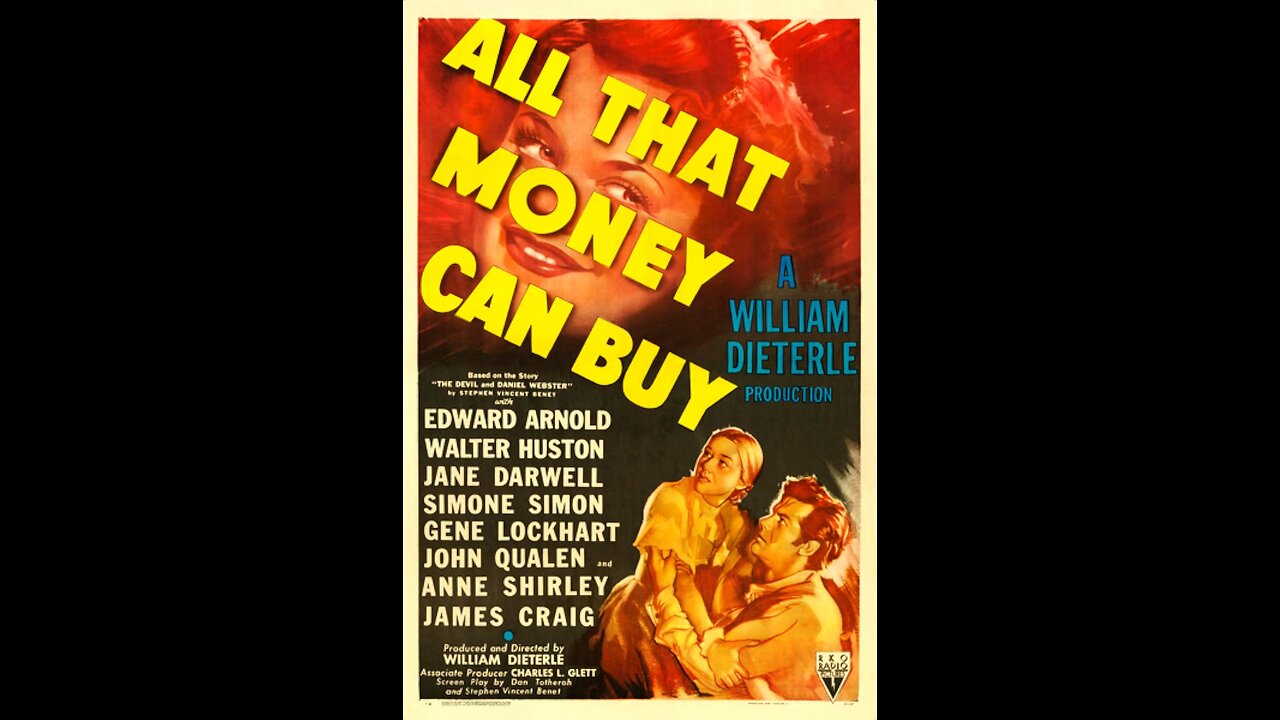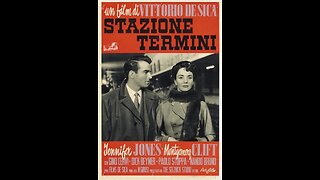Premium Only Content

All That Money Can Buy (aka The Devil and Daniel Webster) (1941) | Directed by William Dieterle
"All That Money Can Buy," also known as "The Devil and Daniel Webster" in some releases, is a 1941 American film directed by William Dieterle. The movie was released on October 17, 1941, and stars Edward Arnold as Daniel Webster, Walter Huston as Mr. Scratch (the Devil), and James Craig as Jabez Stone. The film is based on Stephen Vincent Benét's short story "The Devil and Daniel Webster," which itself is a retelling of the classic Faust legend set in early 19th-century New England.
The film tells the story of Jabez Stone, a down-on-his-luck farmer who, out of desperation, makes a deal with Mr. Scratch, the Devil, trading his soul for seven years of prosperity. As Jabez's fortunes improve, he becomes increasingly corrupt and estranged from his family and community. Regretting his decision, Stone seeks the help of Daniel Webster, a famous orator and lawyer, to plead his case and win back his soul from the Devil. The climax of the film features a dramatic trial where Webster defends Stone against Mr. Scratch, arguing for the value of the human soul and the power of redemption.
"All That Money Can Buy" is celebrated for its imaginative storytelling, strong performances, and moral depth. Walter Huston's portrayal of Mr. Scratch is particularly noteworthy, bringing a charismatic yet menacing presence to the screen that has been praised as one of the great depictions of the Devil in cinema. Edward Arnold's performance as Daniel Webster is equally compelling, embodying the spirit of American idealism and eloquence. The film's direction by William Dieterle is adept at blending elements of fantasy and folklore with a poignant human drama, enhanced by Bernard Herrmann's Oscar-winning musical score, which perfectly captures the film's mood and themes.
While the film was innovative for its time and is considered a classic, some modern audiences might find its pacing slower than contemporary movies. Additionally, the special effects and some of the storytelling techniques, groundbreaking for the 1940s, may seem dated to viewers accustomed to the high-tech visuals of the 21st century. However, these aspects are also part of the film's charm, offering a glimpse into the filmmaking techniques and narrative styles of an earlier era.
"All That Money Can Buy" remains an important work in the annals of American cinema, notable for its creative adaptation of a classic American tale, exceptional performances, and its exploration of themes like greed, corruption, and redemption. The film stands as a testament to the enduring power of storytelling and the cinematic arts to explore the depths of human nature and morality.
-
 1:28:31
1:28:31
Classic Films & Movies Archive
10 days agoTerminal Station (1953) | Directed by Vittorio De Sica
271 -
 LIVE
LIVE
Matt Kohrs
11 hours agoEarnings Crash, Pump & Dump Scams, and Breaking Market News || Live Trading
623 watching -
 54:00
54:00
SGT Report
14 hours agoONLINE TROLLS & SURVIVING VAX-INDUCED CANCER -- Dr Len Horowitz
15.8K8 -
 LIVE
LIVE
LFA TV
13 hours agoLFA TV ALL DAY STREAM - WEDNESDAY 8/6/25
5,095 watching -
 1:33:10
1:33:10
Chicks On The Right
4 hours agoCandace goes after Megyn, Big Balls attacked, Trump on the roof, & Liz goes full socialist
14.9K13 -
 4:03:39
4:03:39
The Bubba Army
1 day agoDiddy Asks Trump For Pardon- Bubba the Love Sponge® Show | 8/06/25
45.3K6 -
 1:09:17
1:09:17
Greg Hunter's USAWatchdog.com
11 hours agoMan has No Control Over Black Star Black Swan – Weston Warren
13.5K16 -
 55:44
55:44
Game On!
18 hours ago $0.61 earnedCJ Stroud's MAKE or BREAK Season with the Texans?
12.8K1 -
 47:58
47:58
BlaireWhite
20 hours agoEpstein Survivor Interview: Exposing Everyone and Everything
22.7K36 -
 21:56
21:56
Producer Michael
21 hours agoI JUST BOUGHT $1,000,000 OF NEW CARS!
18.5K8